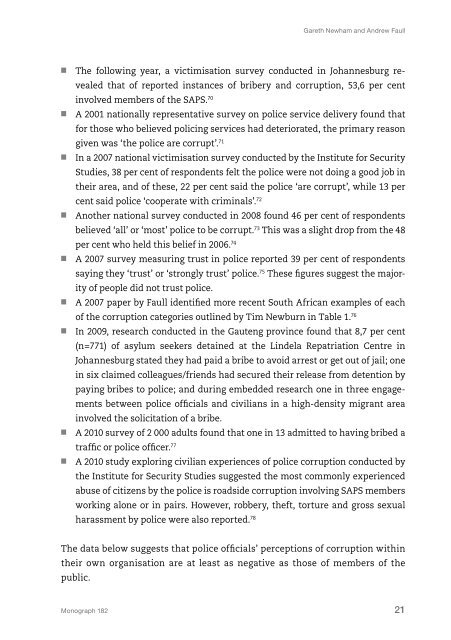Protector or predator? - Institute for Security Studies
Protector or predator? - Institute for Security Studies
Protector or predator? - Institute for Security Studies
Create successful ePaper yourself
Turn your PDF publications into a flip-book with our unique Google optimized e-Paper software.
Gareth Newham and Andrew Faull<br />
■■<br />
■■<br />
■■<br />
■■<br />
■■<br />
■■<br />
■■<br />
■■<br />
■■<br />
The following year, a victimisation survey conducted in Johannesburg revealed<br />
that of rep<strong>or</strong>ted instances of bribery and c<strong>or</strong>ruption, 53,6 per cent<br />
involved members of the SAPS. 70<br />
A 2001 nationally representative survey on police service delivery found that<br />
f<strong>or</strong> those who believed policing services had deteri<strong>or</strong>ated, the primary reason<br />
given was ‘the police are c<strong>or</strong>rupt’. 71<br />
In a 2007 national victimisation survey conducted by the <strong>Institute</strong> f<strong>or</strong> <strong>Security</strong><br />
<strong>Studies</strong>, 38 per cent of respondents felt the police were not doing a good job in<br />
their area, and of these, 22 per cent said the police ‘are c<strong>or</strong>rupt’, while 13 per<br />
cent said police ‘cooperate with criminals’. 72<br />
Another national survey conducted in 2008 found 46 per cent of respondents<br />
believed ‘all’ <strong>or</strong> ‘most’ police to be c<strong>or</strong>rupt. 73 This was a slight drop from the 48<br />
per cent who held this belief in 2006. 74<br />
A 2007 survey measuring trust in police rep<strong>or</strong>ted 39 per cent of respondents<br />
saying they ‘trust’ <strong>or</strong> ‘strongly trust’ police. 75 These figures suggest the maj<strong>or</strong>ity<br />
of people did not trust police.<br />
A 2007 paper by Faull identified m<strong>or</strong>e recent South African examples of each<br />
of the c<strong>or</strong>ruption categ<strong>or</strong>ies outlined by Tim Newburn in Table 1. 76<br />
In 2009, research conducted in the Gauteng province found that 8,7 per cent<br />
(n=771) of asylum seekers detained at the Lindela Repatriation Centre in<br />
Johannesburg stated they had paid a bribe to avoid arrest <strong>or</strong> get out of jail; one<br />
in six claimed colleagues/friends had secured their release from detention by<br />
paying bribes to police; and during embedded research one in three engagements<br />
between police officials and civilians in a high-density migrant area<br />
involved the solicitation of a bribe.<br />
A 2010 survey of 2 000 adults found that one in 13 admitted to having bribed a<br />
traffic <strong>or</strong> police officer. 77<br />
A 2010 study expl<strong>or</strong>ing civilian experiences of police c<strong>or</strong>ruption conducted by<br />
the <strong>Institute</strong> f<strong>or</strong> <strong>Security</strong> <strong>Studies</strong> suggested the most commonly experienced<br />
abuse of citizens by the police is roadside c<strong>or</strong>ruption involving SAPS members<br />
w<strong>or</strong>king alone <strong>or</strong> in pairs. However, robbery, theft, t<strong>or</strong>ture and gross sexual<br />
harassment by police were also rep<strong>or</strong>ted. 78<br />
The data below suggests that police officials’ perceptions of c<strong>or</strong>ruption within<br />
their own <strong>or</strong>ganisation are at least as negative as those of members of the<br />
public.<br />
Monograph 182 21

















